Make a little difference for the Arakawa River Cleanup
Many different people pick up litter and think about environmental issues, such as trash dumped in and around the river, water quality and nature restoration, in different parts of the river beds, in order to bring back nature to the basin.
The Arakawa River Clean-aid Forum is a Specified Nonprofit Corporation, registered at the Metropolitan Government in Japan. It is run by “participating organizations” (municipalities, businesses, schools, civic groups, and so on) that gather participants and organize volunteer cleanup activities in respective cleanup sessions (areas), mainly during Arakawa River Clean-aid Months in Autumn.
These activities take place in a total of 150 different areas, from upstream Chichibu City to East Beach (Higashi Nagisa) of Tokyo Bay, and involve more than 10 thousand participants each year.
The Arakawa Clean-aid Forum, an NPO, strives to expand the network of people who are aware of the importance of protecting the environment of the river, as well as the environment of the earth, through a wide range of activities.
Make the familiar river cleaner
Picking up litter for a cleaner environment makes everyone feel good!
One small action by one person can make a difference to society.
Restore nature
Protect creatures
Picking up litter leads to protecting creatures from the harm that litter does.
Restore ecosystems
The network of nature in the riverbeds that link to one another forms the base of a larger network that includes surrounding natural environments. Picking up litter to restore reed fields and wetlands contributes also to restoring ecosystems in urban areas.
Make the water cleaner
Reed fields and wetlands have the ability to make water clean. Removing litter that hampers this function results in healthier reed fields and wetlands, thereby contributing to making the water of the Arakawa River and Tokyo Bay, into which the Arakawa River flows, cleaner.
The Arakawa River Now
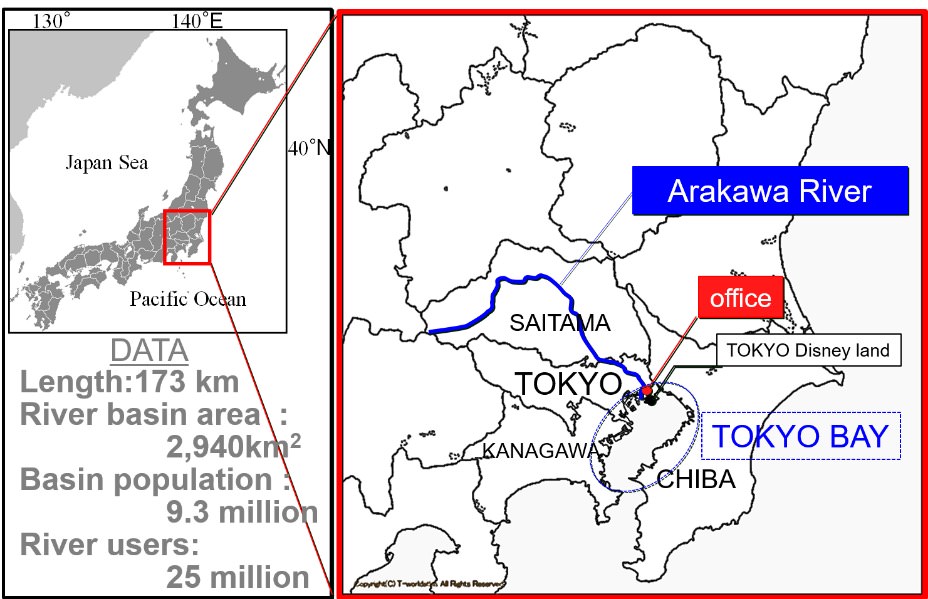
The Arakawa River, which runs through the Tokyo metropolitan area and into Tokyo Bay, is a very important river that benefits the lives of many people. About 10 million people live in its basin, and it provides them with potable water and nurtures many living things. The Arakawa riparian zone is bristling with plants and provides precious habitats for insects, birds, fish and other creatures. These living things, in turn, play a significant role that benefits the river. They help keep the Arakawa River water clean.
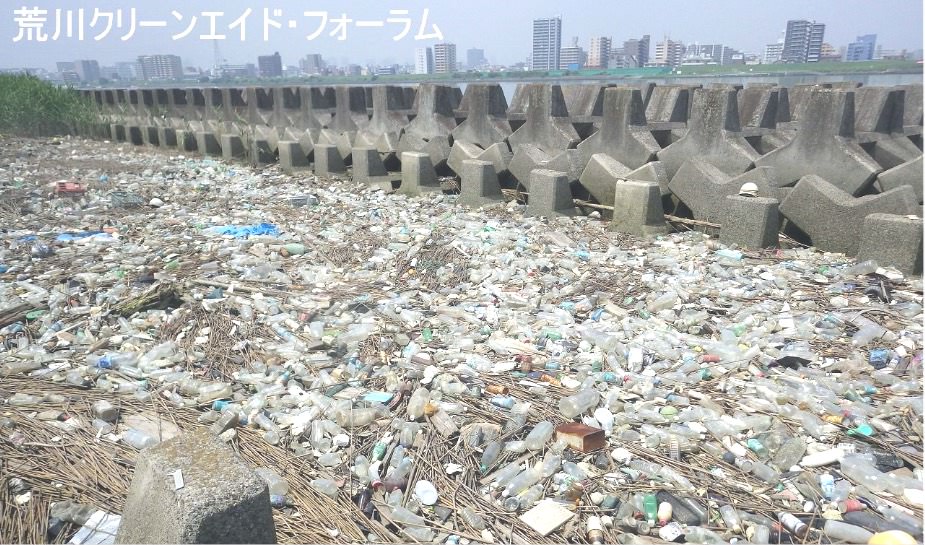
However, trash is accumulating among the reeds and rocks. The adverse impact that can have on the ecosystem cannot be overestimated. The river is now littered with things like countless plastic bottles and illegally-dumped large appliances, and some of the trash is giving off a rotten vegetation-like smell of slime. At this very moment, the ecosystem of the Arakawa River is crying out for help.
Data on the Arakawa River
- Length:
- 173km
- Area of the basin
- 2,940km2
- Population of basin
- 9.8 million (3rd in Japan)
- Population density in the basin (downstream area)
- About 9,800 people/km2 (Largest in Japan)
- Number of river users
- 25 million people per year (Largest class in Japan)
However, rubbish is accumulating between the reeds. The adverse impact this can have on the ecosystem cannot be overestimated.
We start by “PICKING UP”
Join forces and pick up trash in and around the Arakawa River to restore nature. This is what “Arakawa Clean-aid” is about.
Clean + Aid
Many different people pick up trash and think about environmental issues, such as garbage dumped in and around the river, water quality and nature restoration, in different parts of the high-water-channel, in order to bring back nature to the basin.
It has been more than 20 years since Arakawa Clean-aid was launched in 1994. During these years, the amount of bulky waste dumped in the riverbeds has decreased and reed fields have come back to life in some places. Nevertheless, the river is still subject to an endless flow of litters and requires continuous cleanup activities.
In recent years, this movement has expanded to involve participants of a wide range of ages, including elementary, junior high and high school students, and corporate employees who join Arakawa Clean-aid for periods of integrated study, as a volunteer program, and as a corporate social responsibility initiative.
The target of 150 cleanup sessions and 13 thousand participants per year has been reached
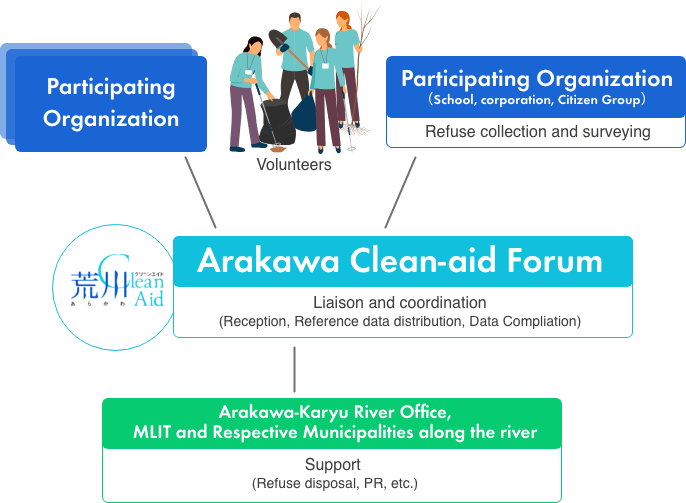
Arakawa Clean-aid is run by “participating organizations” (municipalities, businesses, schools, civic groups, and so on) that gather participants and organize volunteer cleanup activities in respective cleanup sessions (areas), mainly during Arakawa Clean-aid Months in autumn. These activities take place in a total of 150 different areas, from upstream Chichibu City to East Beach (Higashi Nagisa) of Tokyo Bay, and involve more than 10 thousand participants each year. During each session, participants count the numbers of litter items that they pick up. Collected litter is disposed of through cooperation with the municipalities, Arakawa-Karyu River Office (Ministry of Land, Infrastructure and Transport and Tourism) and other related parties. The Arakawa Clean-aid Forum, an NPO, gathers statistics on the litter collected in all cleanup sessions.
Increase awareness of the importance of environmental preservation through picking up rubbish!
The purpose of Arakawa Clean-aid is to raise awareness of the importance of environmental preservation among citizens by working in partnership with “administrators”, “businesses”, “municipalities” and other related parties and providing people with the opportunity to think about nature in and around the river and environmental issues presented by the river through the experience of picking up litter. This is sure to encourage citizens to participate more in improving the environment of this river.
Integrated activities are of vital importance in solving problems!
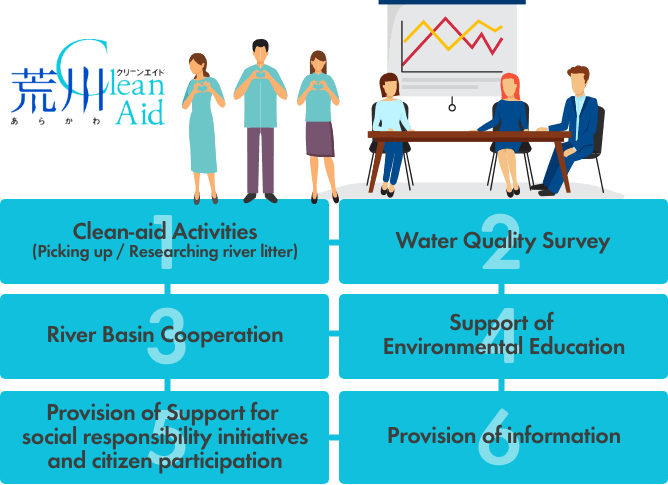
The river keeps on flowing, bringing us both blessings and cursing. The important thing is to grow close to, and interested in, the river and work to improve the environment of the river.
The Arakawa Clean-aid Forum, an NPO, strives to expand the network of people who are aware of the importance of protecting the environment of the river, as well as the environment of the earth, through a wide range of activities.
Introducing our main activities
We carry out a wide range of activities, most notably picking up and researching litter, to raise public awareness by addressing issues related to the Arakawa River environment in an integrated manner!
Clean-aid activities (picking up and researching litter)
-Picking up litter is an eye-opener-
Participants of Arakawa Clean-aid count the numbers of river litter items that they pick up by category. Identifying the types and numbers of litter items allows each participant to raise their awareness of the issue.
Moreover, the results of the research are translated into the development of measures targeted at minimizing the generation of waste to create a waste-free society. This is something more than mere cleanups. The major differences between Arakawa Clean-aid and general “cleanups” are
that:
– The aim is to restore nature.
– Participants count the numbers of litter items that they pick up.
River / marine litter problem as a social issue
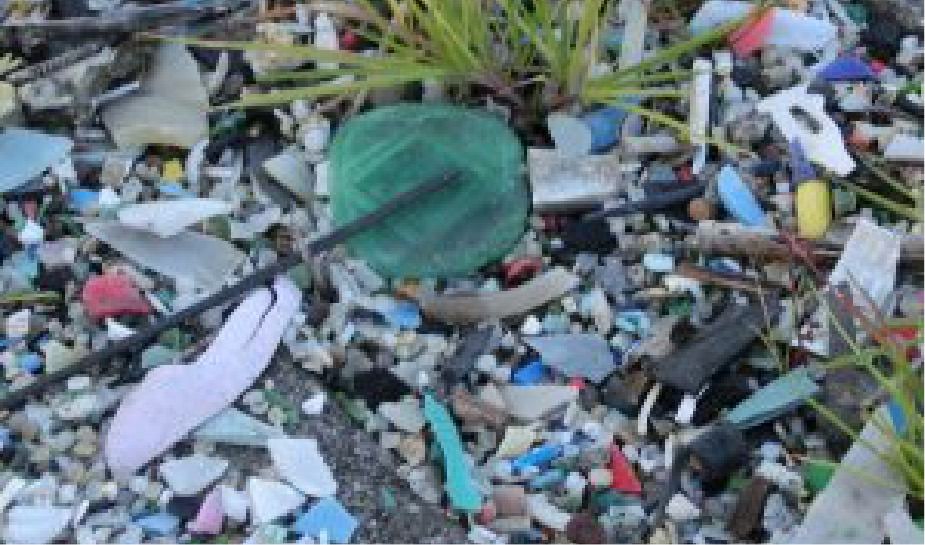
In recent years, the problem of river and marine trash has attracted attention as one of the most important global social tasks to deal with. River and marine trash not only impairs landscapes, but it also causes ill effects on the ecosystem. Plastic waste in particular has extremely adverse effects. Part of the trash such as fishing lines entangle and kill sea creatures. A worse thing is that plastic waste fragments become “microplastics” from the effects of wind, waves and ultraviolet rays. Such degraded plastic densely absorbs underwater hazardous chemicals and is inadvertently ingested by animals such as fish, seabirds, turtles, etc. Then, there is concern that microplastics are being conveyed through the food chain and are also affecting human diets.
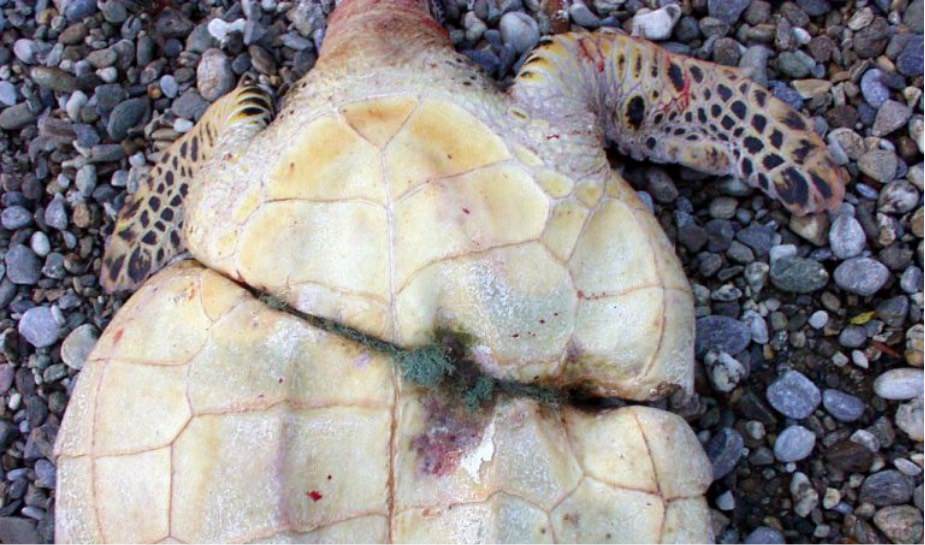
According to the Ocean Conservancy Report 2009, more than 50 to 80 percent of marine trash comes from urban areas. Waste materials, which are dumped in urban areas, end up in rivers and then drift out to the ocean. An incredible amount of trash that is drifting through riparian zones should be stopped as early as possible before it spreads out to the ocean and before it fragments into micro-plastics. The World Economic Forum and the Ellen MacArthur Foundation show in a report, “The New Plastics Economy: Rethinking the Future of Plastics,” that there could be more plastic than fish in the ocean (by weight) by 2050. Thus, River and marine trash is a most urgent social issue to resolve with every means available.
Support of environmental education
It is more important to have “fun” than simply “study”

We support waterfront environmental learning using the Arakawa River through activities such as providing support for integrated study classes of elementary and junior high schools, hosting instructor training courses and publishing “A Guide to Practicing Arakawa Gakushu” and “A Guide to Enjoying and Learning about the Arakawa River.”
In addition, we also provide nature observation programs, eco-tours and other programs to raise children who know how to safely play in and around the river.
Provision of support for corporate social responsibility initiatives and participation of citizens
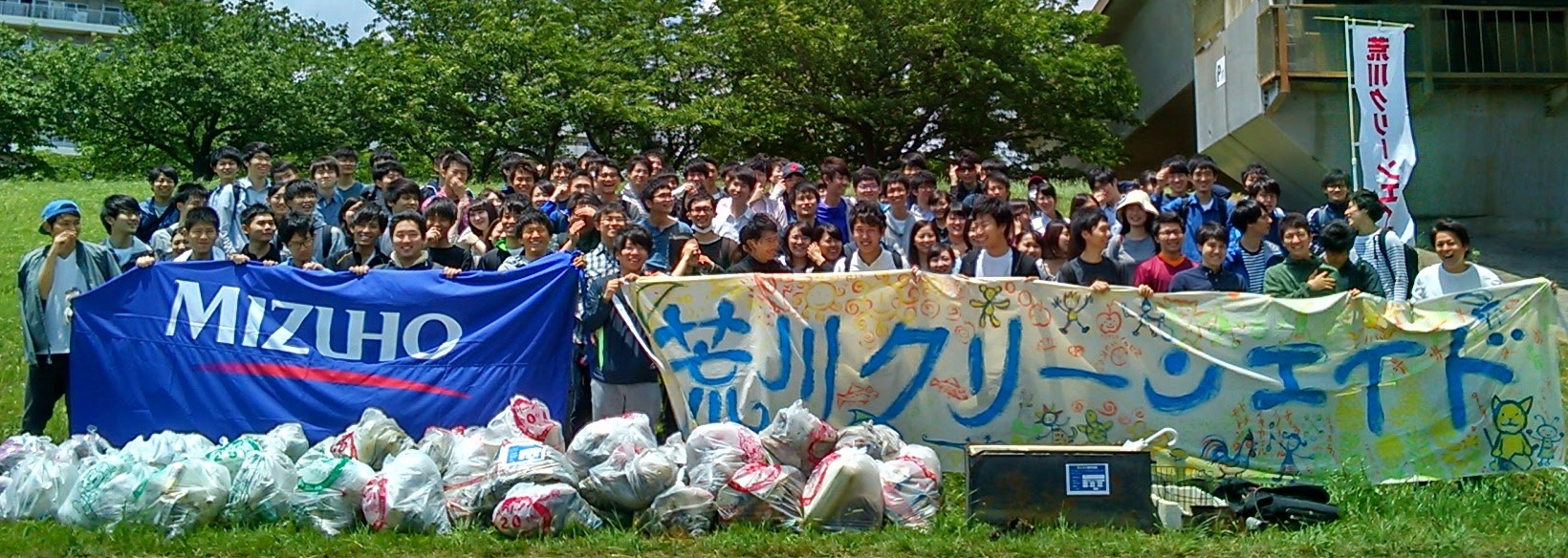
We provide the support you need by making the most of our more than 20 years of experience
We provide corporate and government employees and other people with opportunities to demonstrate their social responsibility through participating in Arakawa Clean-aid, training courses of various kinds, and other programs. In response to growing demand, we are now inviting more companies to take part in our employee training programs. For more information, please refer to the relevant materials we have prepared.
Save Biodiversity

Our lives are living through enjoying benefits from biodiversity. Biodiversity thus serves as a basis of the survival of human beings. In addition, biodiversity, as the particular assets of each region, also supports the diversity of unique regional culture. We remove non-native species such as a golden rods (Solidago altissima),Giant Ragweed (Ambrosia trifida) and burr cucumber (Sicyos angulatus) etc… at downstream of Arakawa river.
In addition, We understand that it is sometimes not good for preserving biodiversity to protect only specific species (the Secretary-General is a PhD. of ecological engineering). We conserve more species by conserving our habitats such as removing river litter, creating wetland, etc…
We need your help
Arakawa Clean-aid is perfect for first-time volunteers!
You are always welcome, regardless of whether you participate on your own, bring a group of hundreds, or just casually volunteer once.
We need your support.
How to JOIN Arakawa Clean-aid action
Participate in Arakawa River Clean-aid as an individual
Anyone is welcome to take part in our cleanup and research activities because they are open to the general public. Why don’t you take your first step as a volunteer worker with Arakawa Clean-aid?
* For venues and other information, please refer to the leaflet for the Clean-aid Months in autumn or our official website (https://www.cleanaid.jp/).
* If you want to participate with a large group of people, please contact
the secretariat in advance.
Participate as an organizing group
Each year we designate October and November as the “Arakawa Clean -aid Months”, during which many cleanup sessions simultaneously take place in many different riverbeds. Companies, schools and other groups of people are strongly urged to participate in these cleanup activities.
* We hold a briefing for organizing groups in September. So even first timers have no reason to hesitate!
Groups who want to participate in Arakawa Clean-aid as “organizers” are recommended to do so during this time of year.
-
- Application of Arakawa River Clean-aid action:
-
- Report for Today Arakawa River Clean-aid action:
-
- Report for detail Arakawa River Clean-aid action:
-
- Captain’s Manual:
-
- Safety Manual:
Hold a Clean-aid session as an organizing group (any time of the year)
If your group wants to organize a Clean-aid session on your own, our secretariat can help you with all aspects from selecting the venue to preparation. You are always welcome to hold one, not only during the Clean-aid Months in autumn, but at any time of year.
* A coordination fee may be charged. For details, please contact the secretariat.
Participate in an employee training program
We also provide training programs mainly for new employees, in which solutions to social challenges are explored through cooperation between corporations and civil groups.
* For details, please feel free to contact the secretariat to get specific information and materials.
How to Clean-up in Sumida Ward area
When you hold a clean-up activity in Sumida Ward area.You need to get volunteer stickers at the Sumida Ward Office. Here is outline.
* For details, please feel free to contact the secretariat.
Cautions for Conducting Cleanup Activities Under the Circumstances of the COVID-19
- 1) Grasp the latest status of infection to decide a scale-down, postponement or withdrawal as needed.
- 2) Do not participate in activities with weakened immunity. Avoid overtime work on the previous day.
- 3) Measure their temperature before activities as needed to confirm they are uninfected with the virus.
- 4) Get people who have fever to stop participating in activities.
- 5) Take appropriate measures to avoid 3C’s: Closed spaces with poor ventilation; Crowded places with many people nearby; and Close-contact setting such as close-range conversations.
- 6) Ensure to keep about 2m distance between people during activities.
- 7) Get participants to wear masks as far as possible (while paying attention to heat attack.)
- 8) Do not pick up masks thrown away.
- 9) It is recommended to disinfect with alcohol taps and door knobs of public water fountains and bathrooms which you are going to use.
- 10) Let people who feel sick return home right away.
- 11) Avoid 3C’s (refer to 5)) when having lunch or parties at restaurants after activities.
- 12) Recommend participants hand washing and gargling after returning home.
- 13) Contact the Arakawa Clean-Aid office (*) if participants are found to be infected. * Their names will be handled appropriately without any leakage to protect their human rights. Refer to the above to take appropriate measures depending on the situations.
How to SUPPORT Arakawa Clean-aid Forum / Donation
We hope that as many individuals and organizations as possible will support our cleanup and nature restoration efforts, which we carry out with the aim of passing down the rich natural environment to future generations.

| Contents | Regular Membership | Supporting Membership |
| Individual | 3,000(JPY) | 2,000(JPY) |
| Group | 10,000(JPY) | 8,000(JPY) |
Your donation would be used to run our organization and all the projects with deep appreciation.
If you wish to donate to a specific project, please contact us beforehand.
If you need a tax receipt, email to allm(at)cleanaid.jp
BANK : MUFG Bank (No.0005), Ltd. Komatsugawa branch(No.463)
SWIFT code/BIC code : BOTKJPJT/BOTKJPJTXXX
Bank account name : Arakawa Clean aid Forum Riji Takayama Makoto
Bank account No. : 0768162
Bank Address : 1-1-1, Matsue, Edogawa-ku, Tokyo, Japan
Participate in and/or support our activities as a member
The Arakawa Clean-aid Forum is financed mainly by membership fees and donations. We invite individuals and groups to become members and support our activities. Members will receive our newsletters, information and reports (In Japanese).
FLOAT-River & NFT & ZEN
FLOAT is an APP about the “river litter problem”.
In this version, you can play four rivers: the Arakawa River, the Nile River, the Yellow River, and the Mekong River.
[How to play]
(1) Select a river.
(2) Tap or swipe to create waves to move river litter to the white basket and collect it.
[Time Warp]
Using the time warp function, you can time warp to the past. The types of “river litter” and the creatures that appear will differ depending on the time period.
[ZEN Mode]
Tap the switch in the upper left corner of the play screen to display the options screen. The switch in the options screen allows you to switch to “ZEN Mode.
[Interlocking with reality]
If you watch the video ads, purchase in-app purchases, or purchase NFT art, our staff will actually collect “river litter” in a “real river”.
The following four plans are available
#Plan-A(iOS & Android)
Watch the video ad (30 seconds)
You will get 4000 in-app coins.
Our staff will collect 2 pieces of river litter in a real river.
#Plan-B(iOS only)
Unlock 1 stage ($0.99)
Our staff will collect 4 pieces of river litter in a real river.
#Plan-C(iOS only)
Unlock all stages($9.99)
Our staff will collect “15L” of river litter in a real river.
*If a locked feature is released in a future update, it will be automatically unlocked at the time of the update.
#Plan-D(OpenSea)
Purchase special NFT art at OpenSea (FLOAT-RiverLitter).
Our staff will collect “1 liter of river litter per 0.002eth” in real rivers.
*Price per piece of NFT art varies depending on the item.
*The amount of collection may change if the price of ethereum fluctuates significantly
The “collection of river litter” in Plan-B and Plan-C is only a secondary content, and the main content provided is “unlocking functions”.
*For the time being, the left bank of the mouth of the Arakawa River (around 3 km upstream from Tokyo Bay) will be designated as the river litter collection area (because more river litter washes ashore at this location).
The total number of times the video ads have been viewed and the total amount charged can be checked on the dedicated website.
(Tap the “i” icon on the lower left of the video ad icon in the app > tap “FLOAT REPORT” > go to the dedicated site).
Please note that there is a time lag of up to several weeks between the time the figures are reflected on the dedicated site.
The “cumulative number of video ad views” and “cumulative number of charges” will be periodically displayed on this site, and a “proof photo” will be posted to prove that the corresponding “river litter” has been collected.
Please check the OpenSea website for the number of NFT art sales.
This is a social experiment, and we plan to improve it through trial and error. The proceeds will be used for practical and educational activities to solve the problem of river/ocean litter.
[Please note the following]
This APP is not an endorsement of the elimination or non-use of plastic products. Plastic products are very useful and beneficial materials for making products, and our society would not be able to survive without them. We believe that illegal dumping, improper management, and excessive use are the three main problems.
[Production]
Design/illustration/Text/Produce : Kakinuma Tsutomu
Programming : Iwase Keijiro
Supervision : Imamura Kazuyuki
Music : K.Takeshi
Special Thanks1
180 Degrees Consulting Japan
Abe Hibiki / Ashikaga Ruki / Imura Shunsuke
Special Thanks2
Attkun, Ayana, Joe, Jun, James, Ken, Kurikuri, Kouhei, Minami, Mitsuharu, Shiratama
FLOAT” is supported by Rethink PROJECT (https://rethink-pjt.jp) and the River Fund.
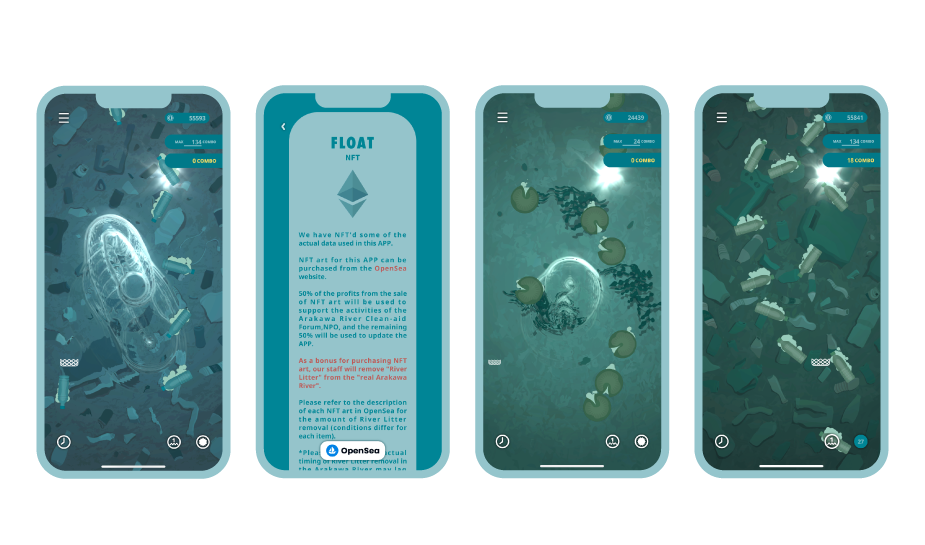
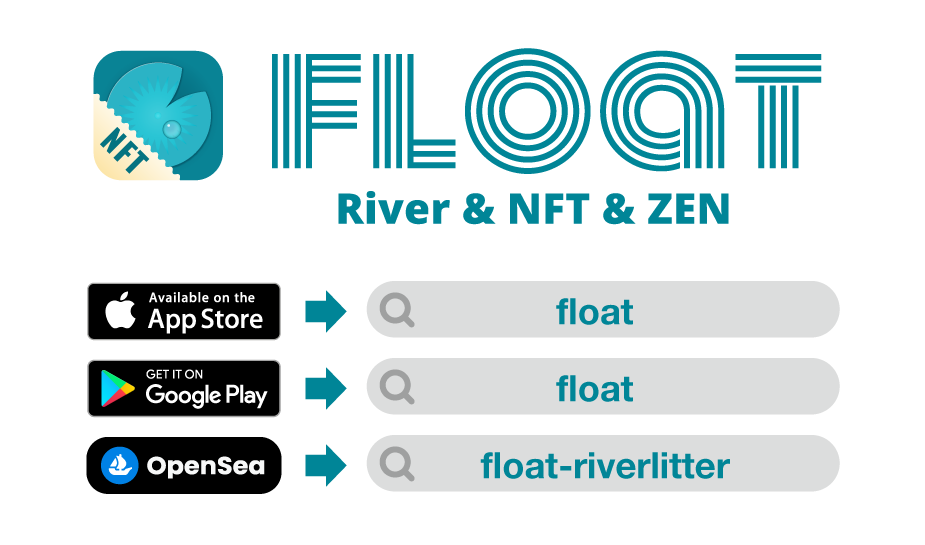
Contact
Address: 204 NIC Heim Funabori, 3-35-13, Higashi-komatsugawa, Edogawa-ku, Tokyo 132-0033, JAPAN
Telephone/ Facsimile: +81-3-3654-7240 / +81-3-3654-7256
Contact person: Director/The Secretary-General : IMAMURA Kazuyuki (Ph.D)
E-Mail : renraku@cleanaid.jp

